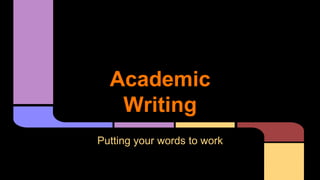Academic writing
- 1. Academic Writing Putting your words to work
- 2. Writing to learn Writing only because it is assigned will not get you very far. Writing is fundamental to learning and will help you develop in all areas of your academic life.
- 3. Range of writing Formal: Multimedia reports Research Papers Plays & Poems Business letters
- 4. The Writing process 1. Prewriting: Select the topic, gather details, form your thesis. 2. Drafting (Writing): Write your first draft using your prewriting plan as a guide 3. Revising: Make changes for depth and clarity
- 5. The Writing process 4. Editing: Make changes to improve grammar, punctuation, spelling and style. 5. Publishing: Prepare your writing to share with audience (formatting, printing, etc.) I can tell if you only do steps 2 and 5!
- 6. Choosing a topic Choose a topic that is appropriate to the assignments. A five-paragraph essay will require a topic that is more specific than a five-page paper. Start with a general idea and narrow it until it fits the scope of the assignment you’ve been given.
- 7. Gathering details The Five W method: Who, what, when, where, why? Throw in How? to be safe. Listing: List your thoughts about the topic writing nonstop for as long as you can. Freewriting: Like listing, but in paragraphs.
- 8. Gathering details Another note: Be familiar with the details you’ve gathered. DO NOT learn about your subject while you’re writing about it. The more familiar you are the easier it will be to write and the better organized your paper will be.
- 9. Begin at the beginning Begin with a surprising fact or statistic. Ask an interesting or challenging question. Start with a revealing quotation. Share a brief dramatic story. Open with a bold statement.
- 10. Develop your idea in the middle Keep your thesis in mind. Always. Develop each point in a new paragraph. Use plenty of details. Use your own words or use quotes. Be open to new ideas. Use the basic writing moves.
- 11. The basic writing moves Narrating: sharing an experience or story Describing: Telling how something looks Explaining: providing important facts & details. Analyzing: carefully examining a subject Comparing/Contrasting: showing how two things are alike and different
- 12. The basic writing moves Defining: identifying or clarifying the meaning of a term. Reflecting: connecting with or wondering about the subject Evaluating: Rating the value of something Arguing: using logic and evidence to prove something is true.
- 13. Bring things to a close Remind the reader of the thesis Summarize the main points Reflect on the explanations or arguments you’ve presented Offer a final idea to keep the reader thinking about the topic.
- 14. Editing: It’s kind of mandatory Once you’ve written your paper and revised it to make sure it is clear and complete, you must take the time to edit it. Think of it as the icing on the cake. An unedited paper is unfinished and errors left on the page will take away from overall quality of your writing. (It also hurts your grade.)
- 15. Editing marks Learn and use these editing marks. I will be using them on your papers as well.
- 16. Strategies for editing Work with a clean copy of your paper and double space to leave room for marking. Check one element at a time (spelling then grammar then punctuation, etc.) Work from the end to the beginning. Read your paper aloud at least once.
















